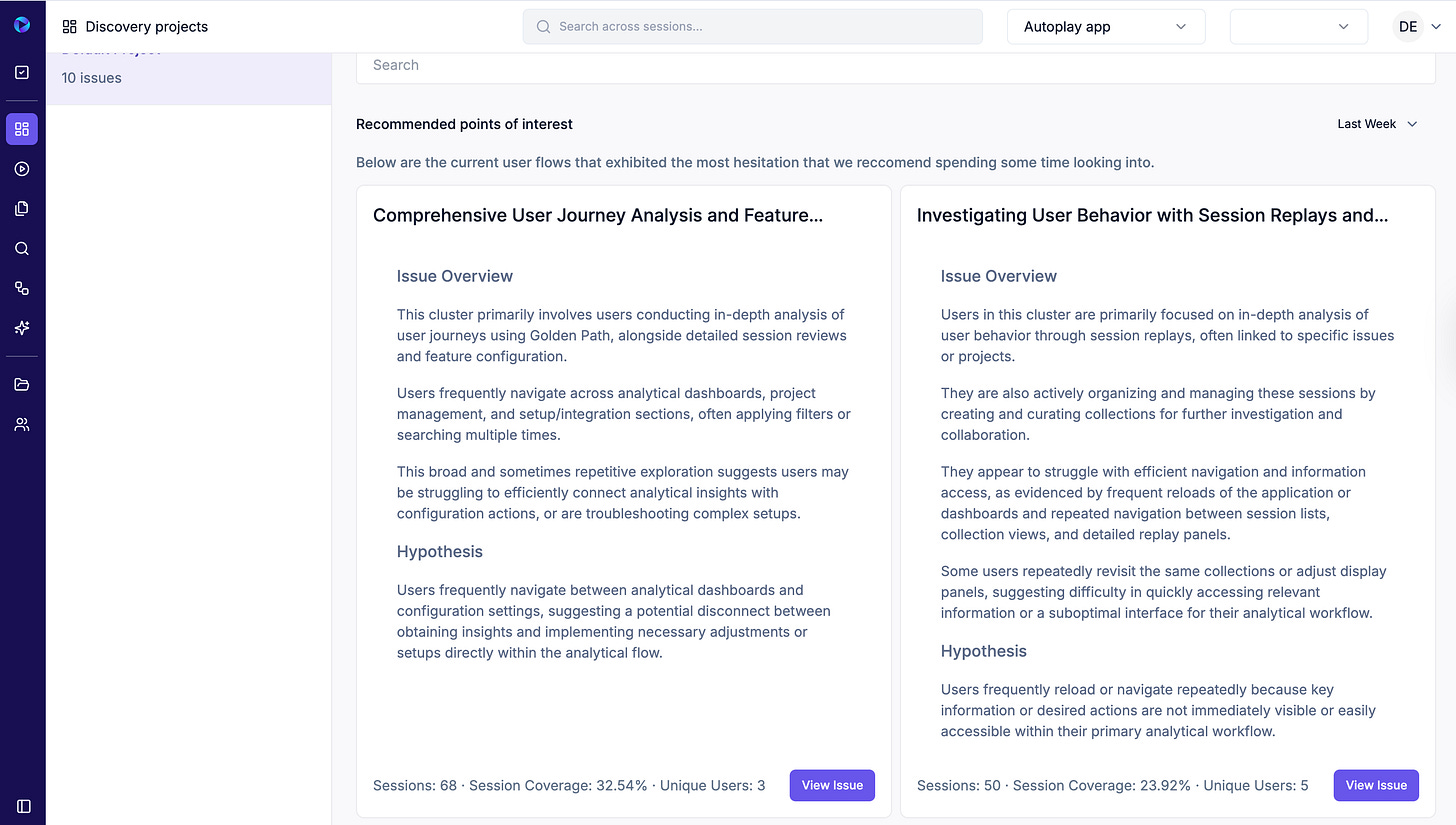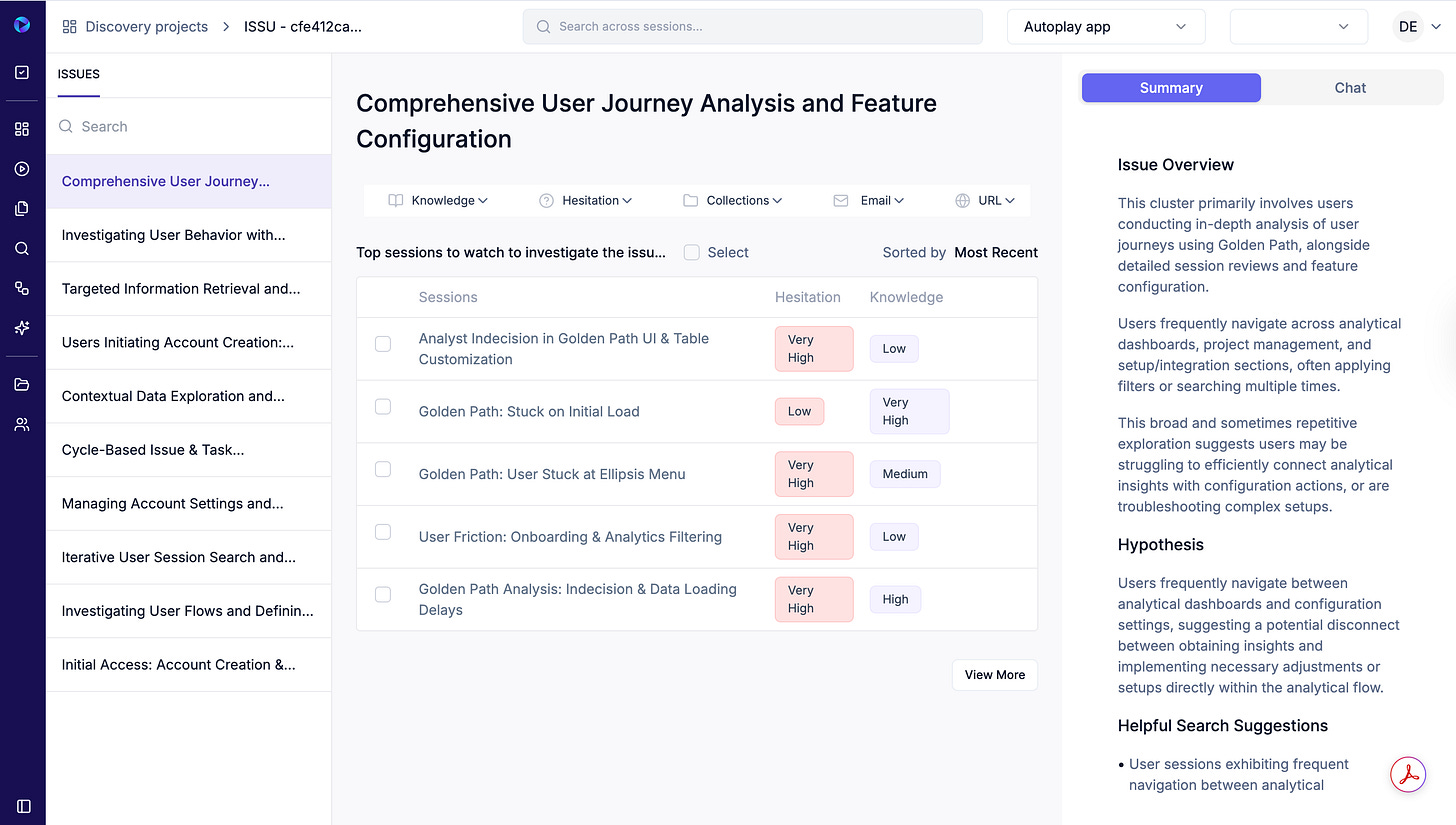Stop Hunting for Problems - Let Them Find You
How Autoplay uses AI to surface the real points of interest before you even start investigating.
The Hidden Problem in Session Replay Analysis
Session replays are great - until you actually have to watch them.
The moment a product manager decides to investigate an issue - onboarding drop-off, a confusing checkout, an underused feature - the real work begins:
Scrolling through hundreds of replays. Clicking through dead-end sessions. Watching users wander, get distracted, or leave for reasons unrelated to your question.
You can filter by URL, event, or feature, but that still leaves you with a mountain of “possible” sessions to dig through. The hard part isn’t finding a session - it’s finding the right sessions.
Ones where the user actually struggled. Ones that will tell you why something is broken, not just that it is.
This is where most PMs waste their time: sifting through noise instead of investigating signal.
Why It Matters
This guesswork has two big costs:
Time - A day spent watching replays is a day not spent shipping fixes. Multiply that across the team, and “investigation time” quietly eats your roadmap.
Focus - When you don’t know where the real friction is, you end up investigating based on gut feel. That means solving anecdotal problems instead of addressing what’s impacting most users.
In other words: without knowing exactly where to look, you risk fixing the wrong things - and leaving the big problems untouched.
What Autoplay Does for You
Autoplay removes the guesswork.
Instead of handing you a blank search bar and a pile of replays, it automatically runs an aggregation of your session data and highlights the points of interest you should investigate.
Think of it like an AI analyst who’s already done the first week of work for you.
Every week (or month, if you prefer), Autoplay surfaces clusters of sessions worth your attention, along with context:
“Below are the current user flows that exhibited the most hesitation. We recommend spending some time looking into these.”
Each cluster includes:
Sessions affected - e.g., 68
Users affected - e.g., 3 unique
Session coverage - e.g., 32.54% of all sessions in that flow
Hesitation score - e.g., 29 (a measure of cognitive friction detected)
From Suggestion to Investigation in Minutes
Click into a cluster and you can:
Review a collection summary of what happened.
Apply filters (by knowledge, hesitation, URL, user, etc.).
Explore relevant session clips without sifting through unrelated noise.
You’re not starting from “maybe there’s a problem here.”
You’re starting from “here’s a problem that’s happening often enough to matter.”
Why This Matters for PMs
This is more than a productivity boost. It’s a fundamental shift in how product teams investigate issues.
From guessing → to guided investigation
From anecdotal → to statistically significant
From scattered replays → to curated collections
By pointing you to the most impactful friction patterns first, Autoplay ensures you’re spending your time on issues that actually move adoption, retention, and revenue.
Not edge cases.
The New AI Layer
What makes this possible is a different kind of AI than most “AI session replay” tools.
Instead of summarizing sessions one by one, Autoplay:
Analyzes every replay for intent, knowledge, hesitation, and workarounds
Clusters sessions with similar friction patterns
Scores and prioritizes them based on how many users they affect
Delivers them as ready-to-review investigation points
It’s not about “watching faster.”
It’s about starting in the right place - so every minute you spend investigating brings you closer to an answer.
The Future: No More Blind Hunts
In a world where products generate millions of sessions a month, the old way of finding problems - filter, hope, watch - is broken.
The future belongs to tools that point you directly at the friction that matters, before you’ve even asked the question.
That’s what we’re building at Autoplay.
So the next time you open your session replays, you’re not starting with a search bar.
You’re starting with the answers.



